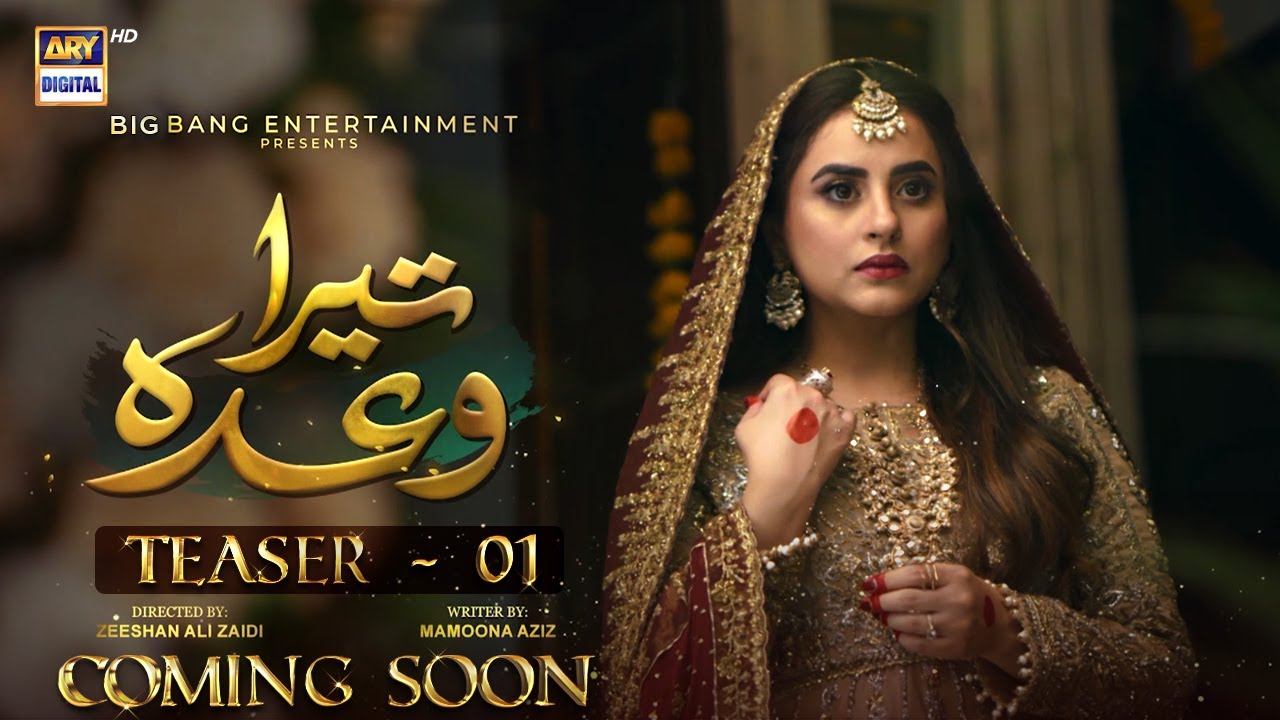Tera Waada Drama Review

Tera Waada Drama Review: Tera Waada, a captivating Pakistani drama serial, has enthralled audiences with its poignant exploration of forbidden love, societal pressures, and the enduring power of human connection. This review delves into the narrative’s twists and turns, analyzes the characters’ journeys, explores the social commentary embedded within the story, and examines what makes Tera Waada a timeless classic.

Love Across the Divide: A Clash of Classes
Tera Waada revolves around Mehreen, a spirited and independent woman from a middle-class background, and Asher, a wealthy and charming man burdened by the constraints of his family’s social standing. Their paths collide, and an undeniable spark ignites a passionate love. However, their relationship faces a formidable obstacle – Asher’s family’s disapproval due to Mehreen’s social status.
-
Forbidden Love: The narrative thrives on the allure of forbidden love. The societal barriers create tension and suspense, making viewers root for the couple to overcome societal prejudices.
-
Class Disparity: Tera Waada delves into the complexities of class disparity in Pakistani society. Mehreen’s experiences highlight the challenges and limitations faced by those from lower socio-economic backgrounds.
-
Sacrifices and Heartbreak: The lovers are forced to make difficult choices, sacrificing personal happiness for the sake of family and societal pressures. Their heartbreak evokes empathy and compels viewers to question the rigidity of class-based judgments.
Characters: A Gallery of Strength, Vulnerability, and Manipulation
Tera Waada boasts a compelling cast of characters with distinct personalities and motivations.
-
Mehreen: The Resilient Protagonist: Mehreen embodies strength and self-worth. Despite facing societal disapproval and manipulation, she fights for her love and refuses to compromise her values.
-
Asher: Torn Between Love and Duty: Asher’s character portrays the internal conflict of a man torn between his love for Mehreen and his obligation to fulfill his family’s expectations.
-
The Antagonist: Weaving a Web of Deceit: An antagonist, whether it’s a family member or an envious acquaintance, might manipulate situations to further their agendas. Through their actions, they create misunderstandings and drive a wedge between Mehreen and Asher.
-
The Supporting Cast: A Circle of Trust: Mehreen and Asher might find solace and support in confidantes and allies. These characters might offer guidance, challenge societal norms, and provide a ray of hope for the couple.
By exploring the characters’ motivations and emotional journeys, Tera Waada creates a deeply relatable and emotionally charged narrative.
Social Commentary: A Reflection of Societal Norms
Tera Waada transcends mere entertainment by offering a poignant commentary on the following social issues:
-
Class System and Prejudice: The drama critiques the rigid class system prevalent in Pakistani society and the prejudice faced by those from a lower social standing.
-
Importance of Individuality: Mehreen’s character serves as an inspiration for those who dare to challenge societal norms and fight for their right to choose their partners.
-
The Burden of Family Honor: The narrative sheds light on the immense pressure placed on individuals to prioritize family honor, even at the expense of personal happiness.
-
The Power of Manipulation: The serial portrays how manipulation and deceit can wreak havoc on relationships and highlight the importance of communication and trust.
By tackling these relevant themes, Tera Waada prompts viewers to reflect on societal expectations and the importance of fighting for love and self-worth.
Beyond the Narrative: Performances and Technical Aspects
The success of Tera Waada extends beyond its compelling script. The following elements contribute to its lasting impact:
-
Stellar Performances: The cast delivers powerful performances that bring the characters to life. Their emotional portrayals elicit empathy and investment in the narrative.
-
Visual Storytelling: Cinematography and set design subtly reinforce the themes of class disparity. Contrasting visuals might highlight the difference between Mehreen’s and Asher’s worlds.
-
Music and Sound Design: A well-crafted soundtrack can enhance the emotional resonance of the narrative. Romantic music might underline moments of love, while haunting melodies could build suspense and evoke sadness during moments of despair.
-
Pacing and Editing: The series utilizes a well-paced narrative with moments of high drama and quieter introspective scenes. The editing seamlessly moves between timelines and perspectives, keeping viewers engaged.
Enduring Appeal: A Timeless Tale of Love and Defiance (Continued)
-
The Power of Redemption: Despite the challenges faced by the central couple, Tera Waada offers a glimmer of hope. The possibility of redemption, forgiveness, and a second chance keeps viewers invested in the story’s resolution.
-
A Spark of Conversation: The series serves as a catalyst for conversations about social change. It encourages viewers to question outdated traditions and advocate for love marriages based on mutual respect and understanding.
-
A Legacy of Performance: The drama has cemented the careers of its lead actors, their powerful performances becoming a benchmark for future Pakistani dramas.
A Deeper Look: Exploring Character Motivations
Beyond Black and White: The Nuances of Human Behavior
Tera Waada excels at portraying characters who are not simply heroes or villains. Each character has a complex backstory, motivations, and vulnerabilities that shape their choices.
-
Mehreen’s Strength and Vulnerability: While Mehreen embodies resilience, she also experiences moments of doubt and despair. This vulnerability makes her a more relatable protagonist.
-
Asher’s Internal Conflict: Asher’s character struggles to balance his love for Mehreen with his fear of disappointing his family. Exploring his internal conflict evokes empathy for his difficult position.
-
The Antagonist’s Complexity: The antagonist’s motivations could be driven by insecurity, jealousy, or a genuine belief in upholding family traditions. Understanding their motives adds another layer of depth to the narrative.
-
The Supporting Cast’s Influence: The supporting characters, whether allies or rivals, might play a crucial role in influencing Mehreen and Asher’s choices. Examining their motivations furthers the complexity of the narrative.
By delving into the multifaceted nature of its characters, Tera Waada creates a more realistic and emotionally engaging storyline.
Social Commentary: Unveiling the Layers
The Plight of Women: The narrative could explore the limitations placed on women’s choices in marriage and career aspirations. Mehreen’s struggle becomes a voice for those who seek agency and equality in a patriarchal society.
The Importance of Communication: Tera Waada subtly highlights the importance of open communication and trust in relationships. Misunderstandings caused by deceit or lack of communication fuel the conflict and serve as a cautionary tale.
The Power of Forgiveness: The series might explore the power of forgiveness and reconciliation. Whether the couple achieves complete forgiveness or learns to coexist despite their differences becomes a powerful message about healing and moving forward.
A Legacy of Social Impact
Tera Waada’s impact extends beyond entertainment. The series:
-
Sparked Conversations About Class Disparity: It opened a dialogue about the need for social reforms and the importance of breaking down class barriers when it comes to love and marriage.
-
Empowered Women to Fight for Their Choices: The series resonated with a generation of women who saw Mehreen as a symbol of courage and the right to choose their partners.
-
Influenced Future Dramas: Tera Waada’s success paved the way for more progressive narratives that challenged societal norms and advocated for love marriages based on mutual respect.
By tackling important social issues and offering a glimmer of hope for change, Tera Waada continues to be a significant part of Pakistani television history.
Conclusion: A Timeless Classic
Tera Waada is more than just a drama; it’s a cultural phenomenon. Its compelling narrative, exploration of complex themes, and stellar performances have cemented its place as a timeless classic. It continues to resonate with viewers by offering a story of forbidden love, societal defiance, and the enduring power of human connection. By dissecting the characters, themes, and social commentary, this review aims to provide a deeper appreciation for Tera Waada’s lasting impact and its contribution to the evolution of Pakistani drama serials.

Leave a Comment